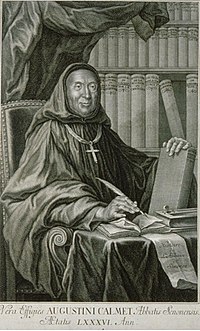Antoine Augustine Calmet
|
The Rt. Rev. Father Abbot Dom Antoine Augustin Calmet, O.S.B. |
|
|---|---|
| Abbot of the Abbey of Senones | |

1750 engraving of Dom Augustin Calmet
|
|
| Other posts | Professor of Exegesis, Abbey of Moyenmoutier, and Abbot General of the Congregation of St. Vanne |
| Orders | |
| Ordination | 17 March 1696 |
| Personal details | |
| Born | 26 February 1672 Ménil-la-Horgne, Duchy of Bar, Holy Roman Empire |
| Died | 25 October 1757 Senones, County of Salm-Salm, Holy Roman Empire |
| Buried | Abbey of Senones |
| Profession |
Abbot and exegete Historian; Scholar; Theologian; Philosopher, Occultist; Translator |
Abbot and exegete
Antoine Augustin Calmet, O.S.B. (26 February 1672 – 25 October 1757), a French Benedictine monk, was born at Ménil-la-Horgne, then in the Duchy of Bar, part of the Holy Roman Empire (now the French department of Meuse, located in the region of Lorraine).
Calmet was a pious monk as well as a learned man, and one of the most distinguished members of the Congregation of St. Vanne. In recognition of these qualities he was elected prior of Lay-Saint-Christophe in 1715, Abbot of St-Léopold at Nancy in 1718, and of Senones Abbey in 1729. He was twice entrusted with the office of Abbot General of the congregation. Pope Benedict XIII wished to confer episcopal dignity upon him, but his humility could not be brought to accept the honor.
Calmet was greatly admired by the philosopher Voltaire, who visited the abbey on several occasions.
Calmet died at Senones Abbey, in the Vosges, near Saint-Dié, on 25 October 1757.
Augustin Calmet was born February 26, 1672 in Ménil-la-Horgne, near Commercy in Lorraine, in a modest family as the Antoine Calmet. His father was blacksmith. After entering the Priory Benedictine Breuil, he joined 15 years at the University of Pont-à-Mousson and follows the course of rhetoric from father Jesuit Ignace The Aubrussel (later the confessor Queen of Spain). At the end of these studies, he joined the Benedictine order of the Congregation of Saint-Vanne and St. Hydulphe. His novitiate is made to the St. Mansuy Abbey Toul where he made his vows the 23rd of October, 1689. He was then sent to study philosophy at St. Èvre Abbey and those of theology at Munster Abbey.
...
Wikipedia
